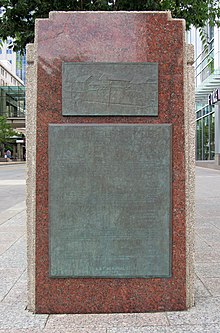First transcontinental telegraph

The first transcontinental telegraph (completed October 24, 1861) was a line that connected the existing telegraph network in the eastern United States to a small network in California, by means of a link between Omaha, Nebraska and Carson City, Nevada, via Salt Lake City. It was a milestone in electrical engineering and in the formation of the United States.[1] It served as the only method of near-instantaneous communication between the east and west coasts during the 1860s. For comparison, in 1841, the news of the death of President William Henry Harrison had taken 110 days to reach Los Angeles.[2]
Background
This section needs additional citations for verification. (October 2021) |
After the development of efficient
California was admitted to the United States in 1850, the first state on the Pacific coast. Major efforts ensued to integrate California with the other states, including sea, overland mail pioneered by George Chorpenning, the Pony Express, and passenger services such as Butterfield Overland Mail. Proposals for the subsidy of a telegraph line to California were made in Congress throughout the 1850s, and in 1860 the U.S. Post Office was authorized to spend $40,000 per year to build and maintain an overland line. The year before, the California State Legislature had authorized a similar subsidy of $6,000 per year.
Construction
Construction of the first transcontinental telegraph was the work of Western Union, which Hiram Sibley, Jeptha Wade, and Ezra Cornell had established in 1856 by merging companies operating east of the Mississippi River.[5] A second significant step was the passing of the Telegraph Act by the Congress in 1860, which authorized the government to open bids for the construction of a telegraph line between Missouri and California and regulated the service to be provided. Eventually, the only bidder would be Sibley, because all competitors—Theodore Adams, Benjamin Ficklin and John Harmon—withdrew at the last minute. Later they joined Sibley in his effort.[6]
Similar to the
Operation

Difficulties did not stop with the completion of the project. Keeping it in operation faced multiple problems: (a) inclement weather in the form of lightning bolts, strong winds, and heavy snow damaged both poles and the wire; (b) rubbing on the poles by bison from time to time sent down sections of the telegraph, eventually contributing to their demise; (c) the system had to be rerouted through Chicago to avoid Confederate attempts to cut the line in Missouri to disrupt communications among Union forces; (d) Native Americans soon started to do the same farther west as part of their hostilities with the Army.[11]
Financially, the First Transcontinental Telegraph was a big success from the beginning. The charge during the first week of operation was US$1 (equivalent to about $34 in 2023) per word, whereas the Telegraph Act of 1860 had specified 30 cents.[10]
The telegraph line immediately made the Pony Express obsolete, which officially ceased operations two days later. The overland telegraph line was operated until 1869, when it was replaced by a multi-line telegraph that had been constructed alongside the route of the First transcontinental railroad.
See also
- Telegraph in United States history
- Australian Overland Telegraph Line, a north–south Australian telegraph line completed in 1872
References
- ^ "Milestones:Transcontinental Telegraph, 1861". IEEE Global History Network. IEEE. Retrieved 27 July 2011.
- ^ Peters 1996, pp. 173.
- ^ (27 May 1844). The Magnetic Telegraph – its Success, New York Daily Tribune (report on transmissions sent on May 25 and published in the Baltimore Patriot)
- ^ Nonnenmacher, Tomas. "History of the U.S. Telegraph Industry". EH.net. Economic History Association. Retrieved 14 October 2021.
- ^ Peters 1996, pp. 178−179.
- ^ Peters 1996, pp. 180.
- ^ Murphy, Miriam B. (October 1995). "The Telegraph was the Information Highway of the 1860s". Utah History to Go. Utah State Historical Society/Utah State History. Archived from the original on March 17, 2018. Retrieved July 7, 2018.
- ^ Peters 1996, pp. 182−186.
- ^ Peters 1996, pp. 190.
- ^ a b Peters 1996, pp. 192.
- ^ Peters 1996, pp. 187−189.
Bibliography
- Peters, Arthur K. (1996). Seven Trails West. Abbeville Press. ISBN 1-55859-782-4.
- Jepsen, Thomas (1987). "The Telegraph Comes to Colorado: A New Technology and Its Consequences". Essays and Monographs in Colorado History. 7: 1–25.
